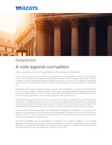
A vote against corruption
I have used this column since 2014 to write about taxes and corporations, which is the subject in which I move professionally. However, seeing that Colombia's future is at stake in the midst of a world in flames, it seems sensible to change the subject to express my opinion on the path we Colombians must choose. I must say that this column contains my personal opinion and, therefore, it only commits me.
Corruption is the cancer of society; and as a cancer -when it appears-, it must be fought to defeat it, and if it is not possible, it must be removed. But it must also be prevented. Many people consciously prevent the appearance of cancer in their bodies with good lifestyle habits: balanced diet, sports, limiting smoking, vaccination, sun protection, personal care, among others.
Despite the existence of penalties for corrupt acts, unfortunately, this practice has been tolerated by Colombians. Incredibly, phrases such as "I will reduce corruption to its fair proportions", said by Julio César Turbay Ayala or "corruption will not end; it is inherent to human beings", said by Miguel Nule, are repeated at cocktail parties as witty and funny phrases, endowed with Colombian picaresque.
I have closely followed the perception of the different candidates to the problem of corruption, but in general, their proposals do not go beyond simple demagogic harangues (such as "we will imprison all the corrupt") or common places full of generalities, but without any precise formula on how to combat or eradicate such phenomenon.
Of all the candidates and pre-candidates for president, only Federico Gutiérrez, in his political debates, I have heard some theses that seem sensible to me and some proposals to fight corruption that I believe are applicable. Besides, his trajectory and transparency in public management give him the moral solvency to be able to talk about solutions in this field.
I will try to summarize what I remember of the proposals made: the long-term solution to the problem of corruption is education; this is a job that must be done from families and schools; generational work will make that, over the years, the culture changes, and issues related to corruption generate contempt and shame (as in certain Asian countries, including Japan).
The medium-term solution is the use of all sources of information, robotics and artificial intelligence to detect pockets of corruption and prevent the commission of this type of acts in a timely manner; the information reservoirs of the different state bodies (Comptroller's Office, Prosecutor's Office, superintendencies, Dian) plus an efficient robotics and artificial intelligence system can generate early warnings to prevent the commission of crimes associated with corruption; the short-term solution is tax redistribution as a mechanism to channel the collection of taxes for specific purposes.
Thus, if certain taxes had a specific destination, there would be more control over their destination, less discretion in spending and more confidence of the people to pay taxes (something similar to what was tried with the system of works for taxes, but for massive application).
The next elections are vital for the future of Colombia. Let's vote intelligently and against corruption.


